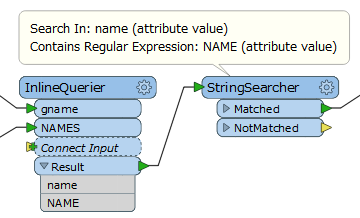I am trying to do a regexp match between 2 datasets and get a merge of the datasets as if it were a join query. Here's the query that I have run on postgres and would like to find help in FME to do it.
WITH g as (select name from gname where feature_code = 'ADM2'),p as (select "NAME" FROM "NAMES" WHERE "PLACE_ID" IN (SELECT "PLACE_ID" FROM "PLACES" WHERE "TYPE" = 'X')) select g.name,p."NAME" from g join p on exists (select * from regexp_matches(g.name,p."NAME"))







